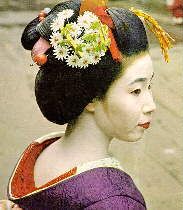
Books on Japanese Culture

One of the major differences between American and Japanese cultures is in the concept of the individual. In the U.S., individuality is stressed at times almost to the extreme. Conformity is stressed in the military, and conformity to various rules and demands in business, but outside of that almost anything goes.
In Japan, however, there is the tradition that "the nail that sticks up is hammered down." In other words, the group becomes more important than the individual and wild non-conformity is strongly frowned upon. Individualism can be seen as a form of selfishness. To go along with the group is considered to be a form of inner strength.
A few brief examples: in Japanese business, decisions are made basically by consensus rather than coming from the top-down as in U.S. businesses. Granted, this can slow down things quite a bit, but it's a reflection of the "group-think" concept. Japanese have two unofficial days during the year that the change seasonal clothing and all people are expected to do that, especially kids in school, whether or not the weather significantly changes. Japanese schools have had uniforms for a very long time. Even there, though, small touches, maybe a small bow here or a pair of socks with bunnies on them can be worn allowing limited individuality within the overall group conformity.
The language itself is another cultural difference. In the U.S., we have words such as Misses and Mister to differentiate women from men, and pronouns like he and she, but that's about it. In Japan, the entire language can change depending on whether or not a person is male or female. Even the way a person refers to themselves differs, the women saying "watashi wa" and the men "boku" (other phrases are also used; these aren't the only two). Not only are their cultural differences in the way language is used by men and women, but the language used also changes according to the social status of the person you are addressing. If you know someone well, you can use an informal language; there is then another level showing somewhat higher respect and a third level showing the highest respect.
There is also a very strong tendency among Japanese to play down their own accomplishments; if you compliment a Japanese person on their use of English, for example, they might well reply that they are not really good speakers at all.
These are just a few of the differences; check some of the references below to learn about others.
Here are some books exploring various aspects of Japanese culture.
Culture Shock! A Guide to Customs and Etiquette: Japan. Rex Shelley. Graphic Arts Center Publishing Company. ISBN 1-55868-071-3. A very good book dealing with things like socializing with the Japanese, doing business with the Japanese and communicating with the Japanese.
Etiquette Guide to Japan. Boye De Mente. Yenbooks. ISBN 0-8048-1643-3. $5.95. A good guide to the often complex rules of Japanese etiquette.
Japanese Etiquette Today: A Guide to Business and Social Customs.James Vardaman, Jr. Charles E. Tuttle Company. ISBN 0-8048-1933-5. If you really want to understand Japanese etiquette then you should get both of these books as they compliment each other quite well.

Japan Today: A Westerner's Guide to the People, Language and Culture of Japan. Theodore F. Welch. Passport Books. ISBN 0-8442-8535-8. $9.95. Arranged alphabetically this is another good introduction to Japanese culture.
NTC's Dictionary of Japan's Cultural Code Words.Boye De Mente. National Textbook Company, ISBN0-8442-8391-6. $17.95. The back of the book is somewhat misleading. This is primarily a book for the foreign businessman in Japan, and how to deal with Japanese businessmen. Fortunately, there is an incredible amount of information in this book for anyone, not just businessmen. It's worth getting and reading, and it's in hardback.
"Salaryman" in Japan Illustrated. Japan Travel Bureau. ISBN 4-533-00665-5. Around $10. This is a little paperback which is chock-full of fascinating information on the life of the typical "salaryman" or working-man of Japan. A lot of this is material I haven't seen in other books. You really get a good idea of just how much influence the workplace has on the average Japanese salaryman (and "Office Ladies").
The Japanese Way: Aspects of Behavior, Attitudes and Customs of the Japanese. Noriko Takada, Rita Lampkin. Passport Books, ISBN 0-8442-8377-0. $12.95. Very readable and lots of good information.
Tokyo Pink Guide: Everything you need to know about Tokyo's sexy pleasure spots. Steven Clemens. Yenbooks. ISBN 0-8048-1915-7. Well, if you want to know where to go for some rather risque to wild action then this book probably has it listed. Also fascinating to read.
Reviews of other books on Japanese culture in general
A Look at Japan
The Art of Japan
A-Z Japan
Bar Flower
Countries of the World: Japan
Culture and Customs of Japan
First Reports
In Search of the Spirit
Japan: Enchantment of the World
Japan: The Culture
Japan: The Culture, another printing
Japan: The People
Japan Ai:A Tall Girl's Adventures in Japan
Japanese Portrait
Jive: Wacky and Wonderful Products from Japan
Look What Came from Japan
Welcome to Japan

Main Index
Japan main page
Japanese-American Internment Camps index page
Japan and World War II index page
|